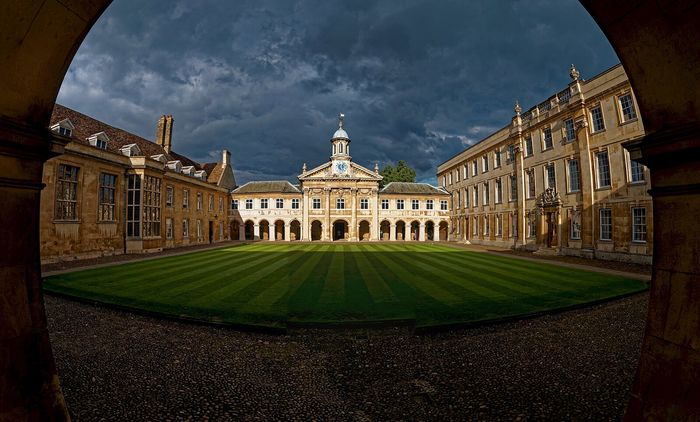“Film photography is the most Marxist thing I do”, Faris Qureshi (2nd Year MML) tells me as he shows me the darkroom tucked away in the basement of his Caius accommodation, a place that, until now, I never knew existed. The ever so slightly dingy room is a space for artistic collaboration; above the glowing red light, scraps of paper covered in handwritten instructions are duct-taped haphazardly on the black walls. Various prints, curiously striped in an attempt to test different exposures, have been left behind by students over the years and now form a little makeshift gallery.
“Film photography is the most Marxist thing I do”
The way Faris sees it, the process of taking photos has become remote and reflexive in the digital age. Just as Marx’s theory of alienation criticises the separation of the worker from the product of their labour, we don’t understand what happens inside of our phones when we take photos, and we don’t ever stop to give it much thought. We become alienated from the products that we make. But with film photography, you retain control over the entire process. Making your own print, for example, is a hands-on procedure that involves exposing photo paper under an enlarger, dipping it in trays of various chemical solutions, and then finally washing it and hanging it to dry. At the end of this tricky process, you are left with something handmade and tangible; something that feels so much more precious than the plethora of photos currently taking up all the storage on my iPhone.

Even taking the picture itself is a tactile experience. The camera has a comforting weight as it hangs around your neck, and the act of winding the film, setting the focus, and hearing the shutter click is endlessly satisfying. This is a process that forces you to be intentional. You can’t take a burst and choose the best one after, and you can’t even review an image and retake it: every shot is deliberate. You have to slow down, think, and really look. In that way, it becomes a practice of mindfulness.
But what else can explain the current resurgence of film in our digital world? Why are people still choosing to dedicate their time to this craft when taking pictures on your phone provides instant gratification? Technology has endeavoured to create tools that realistically capture the world, depicting it exactly how we see it, with every single detail intact. In fact, cameras today create images even clearer and sharper than what our eyes can offer us.

But now, funnily enough, our generation has decided that these pristine images aren’t always what we want. A scroll through Instagram will testify that young people are seeking out the messy and heartfelt: blurry, grainy images with a nostalgic glow that phones struggle to replicate. Film photographs somehow feel softer, more organic. Light leaks, colour shifts, vignette, grain and blur all contribute to that warm, fuzzy aura for which film is known and loved. They seem to have a certain brightness to them, an ability to make the everyday seem special, and Faris’s photos are a shining example of this quality.
It’s clearly not just me who has fallen in love with the imperfections of film: this vintage aesthetic has even spilled over from photography into graphics and advertising. The fact that film cameras have snuck their way onto the shelves of ultra-trendy shops like Urban Outfitters speaks to the extent of their current popularity among Gen Z.
Even digital photographers are attempting to recreate the visual appeal of film during the editing process, artificially adding in texture and colour tints. This retro phenomenon is indicative of a certain tendency amongst our generation: a subconscious longing for an analogue age that we have never experienced, a sense of nostalgia for a simpler time before our existence.
“This article isn’t about dismissing one medium in favour of another”
I’m not telling you to put down your phone and pick up a camera. This article isn’t about dismissing one medium in favour of another. While film photography requires a delicate and slightly unpredictable process, as well as the expense of buying and developing the film, the convenience and effortlessness of smartphone photography is undeniable.

It allows us to document all the tiny precious moments in our lives with ease. But this serves as a gentle invitation to consider film photography as a complementary and rewarding endeavour. After all, in the blurry rush of our digital lives, the allure of the analogue has become increasingly compelling.


